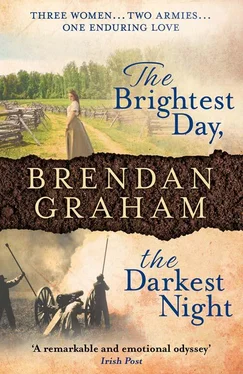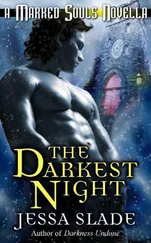When Ellen turned to come back, she saw two figures flit away from the din of the hospital into the glinting night and towards the woods. She hoped they would not arouse the interest of jittery-fingered pickets who lay at every pillar and post between them and the enemy. Especially, as he was a Southern boy.
She would need to speak to Louisa. Urgently.
Jared Prudhomme raised his hand to the winged headdress which Louisa wore.
‘I am afraid to remove it.’
‘As am I,’ she said simply.
Reverentially, the boy raised the starched white edifice above Louisa’s forehead. If he had been expecting her hair to fall, covering her face – it did not. She was cropped more closely than a boy. He touched her cheek. Her eyes never left his for a moment, as if nothing had been revealed. In the far distance, the odd shot loosed by an edgy picket punctured the night. In the near distance she heard a horse.
Tomorrow, she knew, he would return to it. Be out there in some bare, unsheltering plain, or in some fiery copse. Or moving through some ripening wheat field, his golden head … She shivered at the thought. Already he had some fixed premonition regarding tomorrow. She had seen it before in men. Invariably they were right, the death prophecy fulfilling itself. But its foretelling allowed them to prepare. Write the last letter; leave some memento; make final amends with their Maker. The grizzled older campaigners took it all in their stride. They had all ‘seen the elephant’ before. Death, to them was as inevitable as the sun rising. But he was just a boy – a golden boy – and a boy in love.
‘You are more beautiful …’ he began.
‘Sshh!’ she said. ‘Nothing is required.’
When she left him, returned past the silent, growing mounds of limbs, she crossed herself for the limbless and un-whole who, inside the rickety hospital, awaited her.
She considered her solemn vow of chastity not to have been broken.
Inside, the limbless continued dancing unabated, and the un-whole undeterred. Now, songs were interspersed to allow some respite to the dancers, most of the songs hurled insults at the opposite side. The ‘Southern Dixie’ answered by the ‘Union Dixie’.
Way down South in the land of traitors,
Rattlesnakes and alligators …
Or, another ‘Yankee Doodle’.
Yankee Doodle said he found,
By all the census figures,
That he could starve the rebels out,
If he could steal their niggers.
Answered by
We do not want your cotton,
We do not want your slaves,
But rather than divide the land,
We’ll fill your Southern graves.
Then ‘The Irish Volunteer’ of the North clashed with ‘The Bonnie Blue Flag’ of the South. Both, Ellen recognised, sung to the same air of ‘The Irish Jaunting Car’!
The dancing resumed and Ellen was aware that Louisa was back in the midst of things. Shortly thereafter Jared Prudhomme re-appeared and Alabarmy called on him.
‘Lad, if these Yankees can’t whup us with minié balls, they ain’t gonna whup us with songs … so give us one of yer best, boy!’
Jared Prudhomme stood tall, laughed and started to sing.
‘Her brow is like the snowdrift,
Her nape is like the swan,
And her face it is the fairest,
That ’ere the sun shone on.
‘… And for Bonnie Annie Laurie
I’d lay down my head and die.’
They all liked him Ellen knew, both North and South, as did she. He was truly beautiful, in so far as one could ascribe beauty to a youth. But for all his seventeen youthful years, he had a manly bearing. Looked all straight in the eye, neither seeking favour, nor giving it. Yet with that generosity of youth that the cynicism of older age – and war – had not yet destroyed.
He sang as he looked. Clear voiced. Uninhibited by those present. Sang to ‘Annie Laurie’, as if she were there in the very room listening to him. And she was, Ellen knew, casting a glance towards Louisa. The girl’s white-bonnetted head was fixed on the boy. He did not look at her. He had no need to. The spirit within the song left his lips irrevocably bound for no other place than her.
Ellen stood transfixed. The boy reminded her so much of herself. Before she lost the gift. The gift was not the singing itself – the mere outpouring of notes – but the thing within and above the singing. She could still sing – as a person might. But the gift was lost to her. The gift came with purity – purity of intent, purity of the art itself. Letting go of desire, of ambition for the voice – the instrument – to be admired, the singer to be praised. The voice was not the gift, but the gift could inhabit the voice … but not by right or by skill alone.
The boy had the gift. Though he sang for Louisa, he did not sing to her. Then he had stopped before he had started it seemed, leaving them there suspended in the moment. The song, at one level, having passed them by. At another, having entered within, transcending them into some knowledge undefined by words or melody alone.
The listeners came back before he did. Clapped loudly, recognising that they had been transported and were now returned. ‘ Arisht ,’ the Irish called. ‘One more, lad!’ both friend and foe alike, echoed.
The boy just smiled, looked at Louisa, dropped his head slightly to gather himself and then looked at her again. Almost imperceptibly, she motioned her consent, the slightest tilt of her head towards him.
‘With your permission, ladies, I will dedicate this song to you all who daily raise us up.’
Acclamation arose from all those assembled. Again he looked at the ground, waiting until the burr of noise had receded.
‘When I am down and, oh my soul, so weary;
When troubles come and my heart burdened be;
Then, I am still and wait here in the silence,
Until you come and sit awhile with me.’
At the refrain, this time he looked directly at Louisa. She held his gaze, letting his sung words seep into her.
‘You raise me up, so I can stand on mountains;
You raise me up, to walk on stormy seas;
I am strong, when I am on your shoulders;
You raise me up … to more than I can be.’
All were hushed as the boy drew breath.
‘You raise me up, so I can stand on mountains;
You raise me up to walk on stormy seas;’
This time they all joined in, raising their voices in the redemptive words. A chorus of broken angels but all fear lifted from them.
‘I am strong, when I am on your shoulders;
You raise me up … to more than I can be.’
At the final line his gaze never removed from Louisa, the rapture on her daughter’s face provoking the opposite emotion in Ellen. When he finished there was again the hiatus, no one wanting to break the moment, steal wonder away.
‘We’ll give you that – you can sing you Rebs!’ Hercules O’Brien eventually ventured, nodding his block of a head in approval at the boy. Then looking at Ellen he called for ‘A soothing Irish voice to calm the storms of battle’.
She resisted, didn’t want to follow the boy, break the spell he wove. Then the boy himself called her, ‘It would do us great honour. Mrs Lavelle – a parting song. A song some may not hear again … after tomorrow.’
All knew what he meant. Some did not look at her … shuffled uneasily. Those that could – those recovered by her healing hands who, tomorrow would go out again – she could not refuse them. For some reason the pale and riderless horse flashed by her mind.
She started falteringly, sang it to the boy. Her own favourite. Favourite of all whom she loved and who in turn had loved her.
‘Oh, my fair-haired boy, no more I’ll see,
Читать дальше












